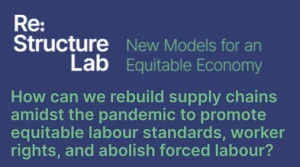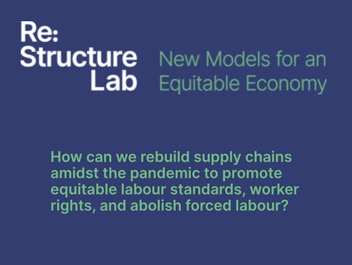Forced labor in supply chains isn’t the result of a few bad actors hiding in the shadows. It’s the logical and even necessary result of a business model that prioritizes the maximization of short-term profits at the expense of anything that might get in the way.
 This fact is at the heart of every effort to end forced labor and human trafficking in global supply chains, and it’s the center of the work of Re:Structure Lab, which Humanity United is proud to support.
This fact is at the heart of every effort to end forced labor and human trafficking in global supply chains, and it’s the center of the work of Re:Structure Lab, which Humanity United is proud to support.
Led by a team from the Sheffield Political Economy Research Institute (SPERI) at the University of Sheffield, the Center for Human Rights and International Justice at Stanford University, and Yale’s Gilder Lehrman Center for the Study of Slavery, Resistance, and Abolition, Re:Structure Lab distills years of academic research into an actionable set of recommendations, aimed at addressing the root causes of forced labor and worker exploitation in supply chains and bringing about systemic change.
Re:Structure Lab has released four issue briefs thus far; one focused on putting pressure on companies through legislation, one focused on pushing companies to change the purchasing practices that force their suppliers to cut costs in any way they can, one focused on the ways investors can work to end – or further entrench – labor exploitation, and one focused on how workers have been shut out of the process of distributing value across corporate stakeholders.
 Their latest brief, on Labor Share and Value Distribution, examines why, amidst skyrocketing corporate profits and ever-increasing financial rewards for those in power, workers struggle to access a declining share of created value, and in fact face downward pressure on their own wages. These rewards to executives and shareholders have come on the backs of exploited workers. Recommendations focus largely on the actions that governments must take to rein in the corporate world’s fast-paced, low-cost dynamic and address the massive (and growing) power differential between corporate leadership and workers.
Their latest brief, on Labor Share and Value Distribution, examines why, amidst skyrocketing corporate profits and ever-increasing financial rewards for those in power, workers struggle to access a declining share of created value, and in fact face downward pressure on their own wages. These rewards to executives and shareholders have come on the backs of exploited workers. Recommendations focus largely on the actions that governments must take to rein in the corporate world’s fast-paced, low-cost dynamic and address the massive (and growing) power differential between corporate leadership and workers.
The brief on due diligence and transparency legislation sets out key requirements for strong and effective human rights due diligence legislation, explaining how governments can use these reforms to spur wide ranging changes to business practices, providing key criteria for strong human rights due diligence in practice, and showing how companies can implement effective due diligence programs that are sensitive to racial and gender inequality.
The brief on commercial contracts and sourcing highlights how illegal practices like forced labor are hard-wired into our economy by common purchasing practices like entering into contracts that are below the cost of production (including refusing to adjust prices in light of rising minimum wages), significant delays in payments to suppliers, putting extraordinary pressure on suppliers to deliver quickly, and charging heavy financial penalties for delays.
Re:Structure Lab’s brief on investment patterns and leverage, examines how changing patterns of investment, including the financialization of the global economy and concentration of corporate ownership, have driven the use of forced labor, and how socially-conscious investors can use their leverage to push back. This is a fast-moving topic with important developments happening often, and this brief includes recommendations for fellow academics, as it asks researchers to study the effectiveness of public and private sector efforts to leverage investment patterns and power to combat forced labor in supply chains.
Future briefs will focus on Social Auditing and Ethical Certification, and Worker Debt and Inequality. When taken as a whole though, the project will provide a roadmap for a restructured business model that prioritizes more than just the maximization of profit.

 This fact is at the heart of every effort to end forced labor and human trafficking in global supply chains, and it’s the center of the work of
This fact is at the heart of every effort to end forced labor and human trafficking in global supply chains, and it’s the center of the work of 